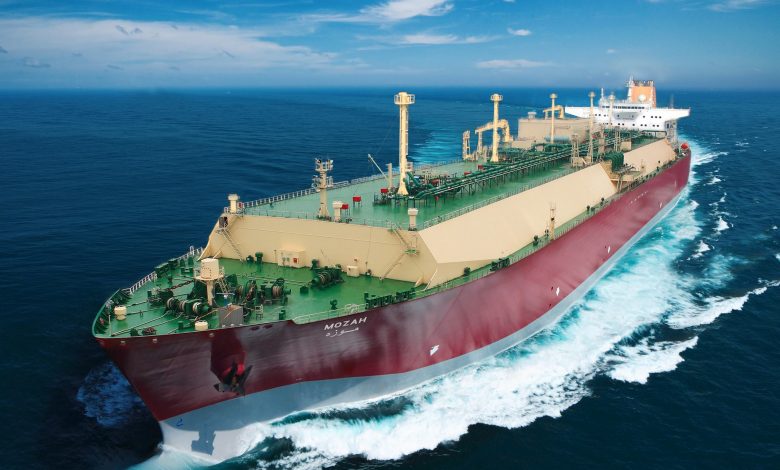
Global Village Space: Qatar will build the largest LNG carriers fleet
جلوبال فيلاج سبيس: قطر ستبني أكبر أسطول ناقلات غاز
global village space:
Qatar Petroleum (QP) has placed the largest order in the history of shipbuilding to a Chinese company. QP has secured slots for building eight 175,000 cbm LNG carriers along with the option for eight additional vessels at China’s Hudong–Zhonghua Shipbuilding. This deal is reportedly worth $3 billion and the vessels are scheduled for delivery to Qatar in 2024-25.
Qatar Petroleum is gearing up to book 120 newbuild slots at Global LNG shipyards to cater to its planned North Field Expansion (NFE) project which will increase the country’s liquefaction capacity from 77 mtpa to 110 mtpa – some sources claim to 126 mtpa.
Qatar’s North Field Expansion Project
North Field, the world’s biggest single non-associated natural gas field, lies offshore north-east Qatar peninsula – it was discovered in 1971. The field is owned by Qatar Petroleum and is operated by its subsidiary Qatargas.
Qatar Petroleum (QP) had announced the expansion of the gas field in April 2017 after revoking its 12-year self-imposed ban on field development.
The expansion will increase Qatar’s liquefied natural gas (LNG) production capacity from 77 million tonnes per annum (Mtpa) to 110Mtpa, which accounts for a production capacity increase of approximately 43%.
This expansion project has been planned in two phases with Phase -1 consisting of four liquefaction trains (33 mtpa) and Phase-2 with two liquefaction trains (16 mtpa). The first train of NFE Phase-1 is expected to commence operations in 2025.
Qatar ignores Korean giants like Hyundai and Samsung?
The Qatar order, as mentioned above, is the largest of its kind in LNG shipbuilding history and is expected to take up 50-60% (based on expected 60-80 vessel order) of the Global LNG shipyard capacity. South Korea’s three major LNG shipyards – Hyundai Heavy Industries (HHI), Samsung Heavy Industries (SHI), Daewoo Shipbuilding and Marine Engineering (DSME) – along with China’s Hudong-Zhonghua were shortlisted by Qatar Petroleum in February 2020.
In terms of LNG shipbuilding, South Korean shipyards have more experience and higher technical expertise than shipyards in other countries – including China. In the present order book of LNG carriers above 150,000 cbm, the three major South Korean LNG shipyards have 91 LNG carriers on order while Hudong-Zhonghua has just two on its books.
China will need 80% more natural gas by 2030 to meet its growing demand which can now be sourced from Qatar. It is expected that China’s LNG demand will grow at a CAGR of 7% during 2020-25 to 96 million tonnes
Therefore, the first order in the series being awarded to the Chinese shipyard was surprising, to say the least. However, it is expected that ultimately a major part of the 60-80 vessel orders will be bagged by South Korean shipyards. Doha’s decision to award the principal contract to a Chinese firm – despite lesser expertise available in China – can be considered “strategic”
Qatar: strategic relationship with China
Doha, in this deal, not only benefits from competitive pricing but is attempting to open doors to higher Chinese investment
Analysts believe Qatar Petroleum (QP) was able to strike the deal at a competitive price of USD180 million per vessel given its strong bargaining position. This price is about 5% lower than the newbuilding price of similar vessels ordered in December 2019.
Shipbuilding analysts believe Qatar Petroleum’s massive order for LNG ships at China’s shipyards may translate into investment by China-based companies in Qatar’s North Field expansion project. China will need 80% more natural gas by 2030 to meet its growing demand which can now be sourced from Qatar. It is expected that China’s LNG demand will grow at a CAGR of 7% during 2020-25 to 96 million tonnes.
Such is the quantum of China’s energy needs and gas imports that even with current lower LNG spot prices, China still imports around 82% of its LNG through long-term contracts with the balance met through spot or short-term contracts. Therefore, in order to meet the growing LNG demand in the country, China will look to secure more long-term cargoes in the coming years.
Qatar China Energy Trade: Adverse effects for US Exports
Analysts believe strengthening relations between Qatar and China will adversely affect US LNG export projects. These projects would have benefitted from supply deals with China given that the latter removed the previously imposed 25% tariff on US LNG. But given the ongoing trade tensions between US and China this looks unlikely.
In terms of vessel supply, Qatar’s order at China’s shipyard is expected to break the dull market of new orders for shipbuilding. In 2020 speculative ordering is drying up and project-linked ordering is now expected to be delayed to 2023-24.
source: hglobalvillagespace
عواطف بن علي – الشرق:
أكد تقرير لموقع “جلوبال فيلاج سبيس” أن ابرام قطر للبترول عقد لبناء ناقلات غاز طبيعي مسال في الصين ،في مشروع هو الأضخم يعد دلالة على مضي دولة قطر في مشاريع توسيعها لحقل الشمال الحيوي باعتبارها مورد طاقة آمن وموثوق ، كما أنه يدعم التعاون الاستراتيجي بين الدوحة و بكين و يفتح الأبواب أمام استثمارات صينية مع المؤسسات القطرية بأعلى ربحية و أكثر أهمية على المدى الطويل وأبرز التقرير الذي ترجمته الشرق انه في اطار مشروع ضخم لبناء أسطول ناقلات الغاز الطبيعي المسال الأكبر من نوعه في تاريخ الصناعة النفطية؛ وقعت قطر للبترول عقدا لبناء عدد من الناقلات في الصين، لتكون جزءا من متطلبات أسطول الناقلات اللازم لدعم مشاريع إنتاج الغاز الطبيعي المسال، ومن ضمنها مشاريع توسعة حقل الشمال. و ذلك في اطار خطة التطوير و التوسع القطرية حيث سيسهم الأسطول في تلبية متطلبات شحن الغاز الطبيعي المسال من مشاريع قطر للبترول المحلية والعالمية، واستبدال بعض ناقلات أسطول قطر الحالي، بالإضافة إلى استيعاب الزيادة الكبيرة المتوقعة في إنتاج حقل الشمال من 77 مليون طن سنويا إلى 126 مليون طن عام 2027 . ويعد الطلب القطري ، الأكبر من نوعه في تاريخ بناء السفن للغاز الطبيعي المسال ، ومن المتوقع أن يشغل 50-60٪ من القدرات الانتاجية للسفن في الصين .
أوضح التقرير أن العقد الذي تم توقيعه مع مجموعة هودونغ-زونغوا لبناء السفن المحدودة، والمملوكة بالكامل لمؤسسة الصين الوطنية لبناء السفن المحدودة؛ ينص على حجز حصة كبيرة من سعة بناء ناقلات الغاز في أحواض بناء السفن التابعة للشركة لصالح قطر للبترول حتى نهاية عام 2027، و قيمة هذه الاتفاقية تصل إلى نحو ثلاثة مليارات دولار أميركي، حيث يعتمد ذلك على طبيعة المتطلبات، ومدى حجم التوسع في قدرة بناء السفن الصينية. وتعد ناقلة الغاز الطبيعي المسال -التي تبلغ سعتها 174 ألف متر مكعب، والتي سيتم بناؤها لصالح قطر للبترول لأحدث جيل من تصاميم ناقلات الغاز الطبيعي المسال، وتتمتع الناقلة بأداء عالمي رائد من حيث الكفاءة والموثوقية والحفاظ على البيئة .و بين التقرير أن مشروع توسيع حقل الشمال في قطر، هو واحد من أكبر المشاريع في قطر و في مجال الغاز الطبيعي . و قد أعلنت قطر للبترول عن توسعة حقل الغاز في أبريل 2017.و سيؤدي التوسع إلى زيادة الطاقة الإنتاجية للغاز الطبيعي المسال في قطر من 77 مليون طن سنويًا إلى 126 مليون طن سنويًا ، وهو ما يمثل زيادة في الطاقة الإنتاجية بنحو 43٪.أكد التقرير أن الصفقة المبرمة بين قطر والصين استراتيجية حيث لا تستفيد الدوحة في هذه الاتفاقية من الأسعار التنافسية فحسب ، بل تحاول فتح الأبواب أمام استثمارات صينية أعلى ربحية و أكثر أهمية على المدى الطويل .
يعتقد محللو بناء السفن أن الطلب الهائل من قطر للبترول لسفن الغاز الطبيعي المسال في أحواض بناء السفن الصينية قد يترجم إلى استثمار من قبل الشركات الصينية في مشروع توسعة حقل الشمال في قطر. ستحتاج الصين إلى 80٪ من الغاز الطبيعي بحلول عام 2030 لتلبية الطلب المتزايد الذي يمكن الحصول عليه الآن من قطر. من المتوقع أن ينمو الطلب على الغاز الطبيعي المسال في الصين بمعدل نمو سنوي يبلغ 7٪ خلال 2020-2025 إلى 96 مليون طن.هذا هو مقدار احتياجات الصين من الطاقة وواردات الغاز ، حتى مع انخفاض الأسعار الحالية للغاز الطبيعي المسال ، لا تزال الصين تستورد حوالي 82 ٪ من الغاز الطبيعي المسال من خلال عقود طويلة الأجل مع تحقيق الرصيد من خلال عقود فورية أو قصيرة الأجل. لذلك ، من أجل تلبية الطلب المتزايد على الغاز الطبيعي المسال في البلاد ، ستتطلع الصين إلى تأمين المزيد من الشحنات طويلة المدى في السنوات القادمة.
المصدر: al-sharq



